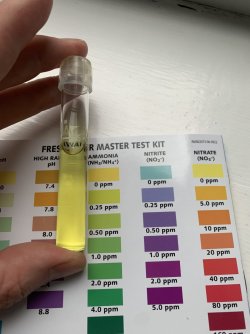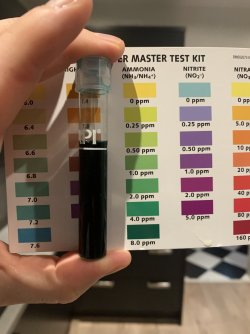The lower range tester looks to be 7.0 or 7.2 for tank water and 6.8 for tap water.
The high range test shows the lowest colour because it can't test any lower than that so you need to go by the lower range tester.
The tank water is tap water that's been standing for 5 days . The tank pH is slightly higher than newly run tap water, probably because the tap water had carbon dioxide dissolved in it, which lowers the pH. After standing in your tank the CO2 has come out of the water causing the pH to go up a bit. This is normal, and it's why we always ask to test newly run tap water and some tap water that's stood for 24 hours.
Just to check - all that's in the tank is plain ordinary sand and plain ordinary gravel? You've not added anything else yet?
The high range test shows the lowest colour because it can't test any lower than that so you need to go by the lower range tester.
The tank water is tap water that's been standing for 5 days . The tank pH is slightly higher than newly run tap water, probably because the tap water had carbon dioxide dissolved in it, which lowers the pH. After standing in your tank the CO2 has come out of the water causing the pH to go up a bit. This is normal, and it's why we always ask to test newly run tap water and some tap water that's stood for 24 hours.
Just to check - all that's in the tank is plain ordinary sand and plain ordinary gravel? You've not added anything else yet?




